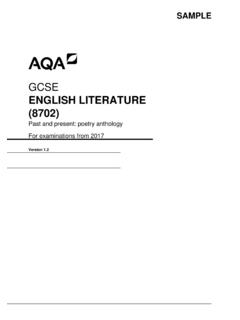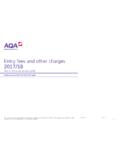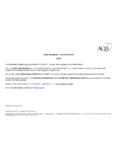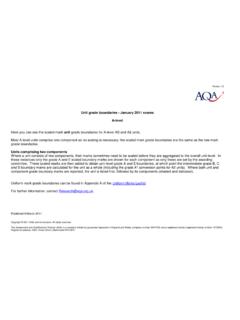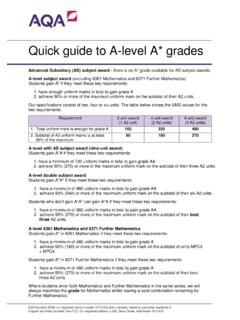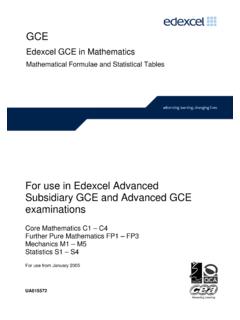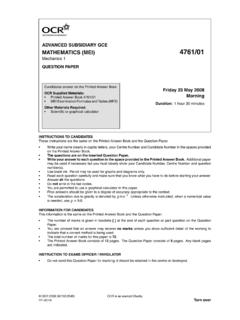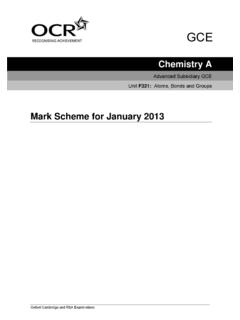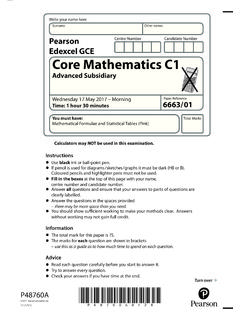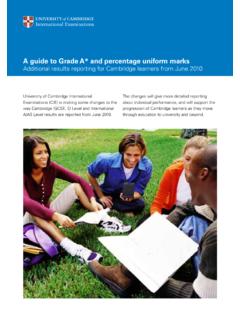Transcription of Entry codes Entry codes - store.aqa.org.uk
1 Entry codes 2017/18 All exam seriesThis document lists the Entry codes for all series in the 2017/18 academic year. Any updates will be posted on the Exams administration/Entries page of our website March 2018 Entry codes 2017/18 3 Contents 1 General information 4 Series 4 Entry codes 4 2 Restrictions on Entry in 2017/18 5 Unique Learner Numbers (ULNs) 5 Discount (classification) codes 5 Prohibited combinations 6 Private candidates 6 Restricted pilot specifications 6 3 Changes to exams 7 A-level reform 7 GCSE reform 7 Availability of reform qualifications within Wales 8 Availability of reform qualifications within Northern Ireland 8 Availability of outgoing GCSE, AS and A-level qualifications 8 GCSE exams in 2017/18 8 4 Explanatory notes on the Entry code tables 9 Example Entry code table 9 Key to symbols 11 5 Entry code tables 13 AQA Baccalaureate 14 AQA Certificate (all levels, including Applied General) 15 AQA Level 1/2 Award 20 ELC ( Entry Level Certificate)
2 25 FCSE (Foundation Certificate of Secondary Education) 27 FSMQ (Free-Standing Mathematics Qualifications) 31 FSMQ Pilot 32 Functional Skills 33 GCE 36 GCE Use of Mathematics Pilot 123 GCSE 125 Project 185 Tech-level 186 Technical Award 208 6 Index to Entry codes 209 Entry codes 2017/18 4 1 General information This document lists the unit and subject award Entry codes for all series in the academic year 2017/18. Further information about making entries is available from the Exams administration | Entries page of our website Series All entries for our examinations are collected by series, irrespective of the method of Entry you use to submit them. The closing date for the receipt of entries and the date of publication of results for particular examinations determine each series. A copy of the Exam series guide 2017/18 in A3 format was sent to your centre in September 2017. It is also available from the Exams administration | Entries page of our website Entry codes Section 5 contains all the Entry codes for all the exams (subject awards, options, units and components) that are available in any given series.
3 You must use the appropriate Entry code irrespective of your method of Entry . Basedata (containing information on the specifications, units, options and components) will also be provided for each series for centres wishing to submit entries by EDI. A separate Entry , using the appropriate Entry code, is required for every assessment (subject award, unit or option) for which a result is to be reported. Before making an Entry for a particular subject, you should refer to: the specification for the subject any changes to examination provision detailed in the appropriate specification any restrictions on Entry detailed in Section 2 of this document. Please see the Exams administration | Entries | Entries for exams officers page of our website for full details on basedata and submitting entries. Entry codes 2017/18 5 2 Restrictions on Entry in 2017/18 Unique Learner Numbers (ULNs) From January 2014, all students entered for an exam at a state funded school/college in England need a ULN.
4 The ULN is a 10-digit number used to access the Personal Learning Record (PLR) of anyone over the age of 14 involved in education or training. The PLR is an online, lifelong record of individuals' achievements which they can share with other parties (for example employers, colleges, universities). Before entering students, you need to get valid ULNs for them that match the details held in the Learning Records Service (LRS). We can't access LRS to amend errors so if there are mismatches, we will return the invalid data to you, via e-AQA, for you to resolve with LRS. Where the ULN is mandatory we will not process entries if the ULN is not present. However, if the supplied ULN returns as a mismatch from LRS we will report this. We will still issue student results as normal but will be unable to upload these to the PLR. ULNs will not replace UCI numbers (Unique Candidate Identifier) so please ensure you include them in your entries submissions.
5 Discount (classification) codes Discounting guidance can be found on the Department for Education (DfE) websites Discounting guidance page of the website QAN website The Department for Education (DfE) assign each specification a national discount code (sometimes referred to as a classification code) on the basis of the subject area it covers - these codes are used in the calculation of school/college performance tables. Some awards (for example GCE Advanced Subsidiary (AS) awards) have two discount codes , as they are grouped differently for key stage 4 (pre-16) and key stage 5 (post-16) discounting purposes1. An early Entry rule for key stage 4 (KS4) qualifications was introduced following the Secretary of State announcement that, from 29 September 2013, only a pupil s first Entry to a KS4 qualification counts towards their school s performance measures. The early Entry rule applies even where qualifications are taken with one exam board and then re-taken with another.
6 Although the new rule does not prevent schools from entering pupils for examinations before the end of key stage 4, it aims to focus attention on whether pupils have been sufficiently prepared to achieve the very best possible outcome in that subject. Pupils can sit an examination more than once but it will be their first certificated grade in that subject that will be used for performance measures. You may wish to advise your candidates that, if they take two specifications with the same discount code, schools, colleges, universities and employers are very likely to take the view that they have achieved only one of the two specifications. The same view may be taken if candidates take two specifications that have different discount codes but have significant overlap of contents. Candidates who have any doubts about their subject combinations should check with the institution to which they wish to progress or company they wish to join, before embarking on their programmes.
7 Discount codes are shown in the tables in Section 5. 1 The JCQ basedata formats only allows for one discount code in basedata. From 2017/18 onwards our basedata includes: Key Stage 4 codes for all Level 1, 2 and 1/2 awards (eg GCSEs), where the DfE have published a KS4 code Key Stage 5 (post-16) codes for all Level 3 awards (eg AS and A-level), and for any other award that hasn t been assigned a Key Stage 4 code. Entry codes 2017/18 6 Prohibited combinations Before making an Entry for a particular subject, you should refer to any statement in the specification that deals with prohibited combinations of units and specifications, in addition to any restrictions of specifications within the same discount code. Candidates entered for prohibited combinations of subjects will be reported on the Centre Entry Query Report. You will be required to cancel or amend the Entry .
8 You must inform us of these decisions by EDI or e-AQA. Private candidates A private candidate is someone who enters for exams through an AQA-approved school or college but is not enrolled as a candidate there. Private candidates may be self-taught, home-schooled or have private tuition with a tutor or through a distance learning organisation. Candidates can only become a private candidate in the UK. Exams are not available for private candidates to sit outside the UK. Not all specifications are available to private candidates and those with internally-assessed units may have restrictions. Further information can be found on the private candidates page of our website Restricted pilot specifications Specifications offered as part of a restricted pilot have been included in this booklet. Most pilot schemes have the maximum number of candidates and centres that can participate determined by the regulator.
9 Centres will normally be invited to take part in the pilot scheme. If you require any information on any of the restricted pilot specifications, please contact the appropriate subject team. Entry codes 2017/18 7 3 Changes to exams A-level reform Some A-levels have been reformed for first teaching in September 2015 (see table below) with the first assessment of AS in June 2016, and the first assessment of full A-level in June 2017. Phase two and three subjects have followed, for first teaching in September 2016 and September 2017 respectively. Changes to AS levels AS levels will be standalone qualifications and will no longer contribute to A-levels New AS levels will be designed to offer breadth to the curriculum and will broadly remain at their current standard In some subjects, it may be appropriate for the AS to be designed to be co-taught with the first year of the A-level Phase one subjects (first teaching September 2015) Phase two subjects (first teaching September 2016) Phase three subjects (first teaching September 2017) Art and Design Business Computer Science Economics English Language English Literature English Language and Literature History Psychology Sciences (Biology, Chemistry, Physics) Sociology Dance Drama and Theatre Studies French Geography German Music Physical Education Religious Studies Spanish Accounting Design and Technology Environmental Science Law Maths subjects (Maths, Further Maths)
10 Media Studies Philosophy Politics GCSE reform English Language, English Literature and Maths have been reformed for first teaching in September 2015 with the first assessment in June 2017. Phase two and three subjects have followed (see table below) for first teaching in September 2016 and September 2017 respectively. There will no longer be GCSE English (which was available for the final time in June 2017). Phase two subjects (first teaching September 2016) Phase three subjects (first teaching September 2017) Art and Design Sciences (Biology, Chemistry, Physics, Double Science) Citizenship Studies Computer science Dance Drama Food Preparation and Nutrition Modern Foreign Languages (French, German, Spanish) Geography History Music Physical Education Religious Studies Business Design and Technology Economics Engineering Media Studies Modern Foreign Languages (Bengali, Chinese, Italian, Modern Hebrew, Polish, Punjabi, Urdu) Psychology Sociology Statistics Entry codes 2017/18 8 Availability of reform qualifications within Wales We are offering all our new GCSE, AS and A-level qualifications in Wales.


